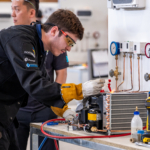2017 turned out to be a big year for us. The highlight for me was Team UK’s amazing success in the Skills Olympics in Abu Dhabi. Team UK achieved a top 10 ranking in the medal tables that ensures British skills are recognised as world-class. As the UK skills minister, Anne Milton, said at the time: ‘Team UK has done fantastically well. There is a message here for parents – university is not the only option. Opportunities from apprenticeships are boundless if people overcome any bias they might have’.
I think 2018 is going to be even bigger for us as governments across the UK push forward their agendas on apprenticeships, technical education and careers advice. We at WorldSkills UK have new plans for the year on our mission to engage, support and inspire more and more young people. And I have three things on my mind about how we might do this in the year ahead – particularly in relation to Europe, engineering and diversity.
Let’s start with Europe. 2018 is due to be the last full year of UK membership of the European Union but this will not affect our participation in Europe’s most important skills competition, EuroSkills, taking place in Budapest in September. What we need to do at EuroSkills this year is demonstrate that we are ‘Brexit ready’ and that the skills of our young people are amongst the best in Europe. Our aim is that these role model competitors will inspire other young people to follow in their footsteps into apprenticeships and technical careers. Home-grown British skills are going to be the key determinant of our ability as an economy to make a success of Brexit. We have a lot to do to help support young people think about careers which will benefit them in the context of a UK which will be focused on globalised trade and investment relationships. And we need to make sure we are helping develop in young people the right mind set, as well as the right skills set, to make the most of these opportunities.
And this brings me to some of the key skills the UK is crying out for – and to my second point – engineering. 2018 is the Year of Engineering and we were delighted that the UK Transport Secretary chose The Skills Show 2017 to officially launch the Year of Engineering. It’s a skill that is vital to our ongoing economic success and it’s right that we celebrate, inspire and promote these careers so that we capture the imaginations of as many young people as possible to be the engineers of the future. British engineers of the past are legion: Brunel, Baird and Bell trip off the tongue as bywords for innovation. Today, we can cite Sir James Dyson and Sir Tim Berners-Lee for technological advances that have truly transformed the way we live. When young people see what engineering and technology can do, they are captivated. Indeed the Dyson stand was again one of the most popular at The Skills Show last year and we are delighted that a number of the young people enrolling in the new Dyson Institute of Technology got their place as a result of attending The Skills Show. The resonance of names like Brunel and Dyson is without question, they are names synonymous with excellence and groundbreaking change. They are also unmistakably male.
Which leads me to my third point – diversity and inclusion. Less than 10% of engineers in the UK today are women. We can’t grow one of our most important professions if it is not seen as open and inclusive to 50% of the population. We have a lot of work to do and must take the opportunity to showcase our inspirational women engineers as part of this great celebration. It’s young women like Team UK’s Betsy Crosby who have the inspiring stories to encourage more young women to follow in their footsteps. Betsy won a medallion of excellence at the Abu Dhabi Skills Olympics for mechanical engineering and did not let the fact that she was only one of only two women (out of 26 total competitors) get in her way. We urgently need more Betsys! And obviously the challenge is bigger than women in engineering. At WorldSkills UK we are targeting action for young women in non-traditional careers, encouraging young people from BAME communities to follow technical careers and encouraging young people from disadvantaged backgrounds to get engaged with our work. We published a report on our targets and action late last year and while we have done a lot, we have more to do – and on areas like social mobility, special educational needs and LGBT+. To be a leading skills nation we need to make use of talented young people from all backgrounds.
That’s why it’s important that governments across the UK are increasingly recognising the importance of world-class careers advice and world-class technical education as drivers for social mobility. Getting the system right is one thing. To complement the system you need real inspiration and that’s where I think Team UK have a big role to play in nurturing aspiration. The typical Team UK member attended their local school and college and works for a local employer. Their story is one that thousands of young people across England, Wales, Scotland and Northern Ireland can relate to. I want young people who haven’t previously thought about getting involved in skills competitions to think: why shouldn’t I be in Team UK? I want Team UK members’ inspirational stories to be a driver for higher career aspirations and that’s why we will be getting more of these world-class role models into schools and online with their stories.
Team UK is at the forefront of our world-class skills revolution. So let’s use 2018 to think big by: showing Europe and the rest of the world that we’ve got the right skills and inspiring more young people down technical career routes; encouraging a new generation to explore careers in engineering, tech and construction; and becoming ever more inclusive in what we do, so that more young people, from all backgrounds, can get a better start in work and life. At WorldSkills UK we are up for the challenge. That is why this year we will be engaging more our partners and the young people we work with in a programme of roundtables, youth summits and research to dig deeper into some of these issues and understand what active role we can play in helping address these challenges. Watch this space for more to follow in 2018!


